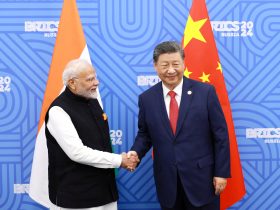
When Donald Trump clinched the US Presidency final week, world leaders virtually stumbled over one another in a frenzied sprint to congratulate him. Clearly the thought was that an additional flourish or two may win them favour with this new emperor of a contemporary empire. This reinforces the notion that America, although in sluggish however regular decline, nonetheless reigns because the preeminent superpower, wielding a worldwide affect that might be as acquainted to a Roman emperor as it’s to the President-elect.
Washington DC – America’s Rome?
The parallels between Washington DC. and Rome—by way of trappings of energy, grandeur and diplomacy—are unmistakable. Very like historic Rome, Washington is a beacon of authority the place world leaders arrive to pay respects and search affect. From the distant reaches of Britannia to the deserts of Egypt, emissaries as soon as travelled to Rome to indulge in its glory and safe the emperor’s favour. In its personal manner, Washington DC seems to be the inheritor to this imperial aura, with diplomats, heads of state and dignitaries flocking to its corridors to align themselves with American energy.
In truth, it isn’t misplaced on us that a number of federal buildings in Washington DC have been closely modelled on Roman structure to convey the beliefs of democracy, liberty and grandeur. It was Thomas Jefferson, considered one of America’s founding fathers, who drew inspiration from the republican beliefs and aesthetics of the Roman Republic, which he admired for its rules of civic advantage, republicanism, and enduring structure. Jefferson influenced the classical architectural fashion that outlined some DC buildings, such because the US Capitol and Supreme Court docket, infusing the cityscape with a Roman grandeur that embodied the rules of America’s founding imaginative and prescient. Certainly, early American Presidents positioned themselves within the custom of historic Greeks and Romans whose vibrant societies and polity stood out for holding public debates and creating rules, such because the rule of regulation, liberty and justice.
Emperors And Presidents
Roman emperors have been famend for his or her skill to undertaking energy, each militarily and culturally, throughout continents—a legacy with simple resonance in at present’s American presidency. Think about Augustus, Rome’s first emperor, who established stability all through the empire and remodeled town into a logo of imperial order. We will see his legacy mirrored in George Washington, whose management cemented stability within the fledgling United States of America, laying the groundwork for a robust nation. Trajan, one other Roman big, oversaw Rome’s biggest territorial growth and initiated important infrastructure initiatives. Theodore Roosevelt, who prolonged American affect and launched main nationwide initiatives, had that very same imaginative and prescient for America. We had Constantine the Nice who was credited to have unified the empire’s geographic and cultural panorama. His counterpart could be Abraham Lincoln, who, amid deep nationwide division, unified the Union and redefined America’s ethical core—a persona with an virtually imperial legacy inside the democratic cloth of the US.
Donald Trump And The Ghosts Of Rome
Historians would bear me out after I say that in terms of Donald Trump, his ‘America First’ rhetoric and extremely publicised misconduct align him most carefully with Nero, Rome’s notorious emperor recognized for his ambition, controversies and self-promotion. Like Trump, Nero loved a fiercely loyal help base, whilst his reign sparked debates and divisions amongst elites and most people. Nero’s confident fashion, mixed with frequent scandals, drew fascination and criticism alike, mirroring Trump’s personal advanced legacy.
But, Trump additionally shares similarities with the lesser-known Caligula, a Roman emperor notorious for his audacity and unconventional method. Caligula challenged norms, defied Rome’s elite, and pursued his imaginative and prescient no matter custom—traits that mirror Trump’s personal disregard for Washington conventions, deep state and norms. Each figures embody a “disruptor” high quality that concurrently captivated and unsettled their societies.
The Enduring Affect Of Empire
It’s fairly fascinating to see that the Roman Empire and the US of America stand because the titans of their eras, every unmatched of their affect and energy over politics, tradition, and beliefs. Rome’s dominance formed regulation and governance for hundreds of years, creating ripples that also echo in Western civilisation. Likewise, America’s cultural and financial attain extends throughout the globe, from Hollywood movies to Silicon Valley improvements, projecting an affect that binds distant nations in a shared sphere.
Indicators Of Decline Of US Hegemony
Similar to Rome was not inbuilt a day, the Roman Empire didn’t crumble in a single day. It was a protracted drawn-out affair marked by overreach, ethical decadence, corruption and a heavy reliance on navy may to carry off the inevitable. It took centuries, however Rome’s finish serves as a cautionary story, not least for the US at present.
Like Rome, the US has positioned itself as a worldwide energy for many years, flexing its muscle groups economically, militarily and culturally. Washington’s affect, as an example, extends to each nook of the globe—simply as Rome’s as soon as did throughout the Mediterranean and past. However beneath the floor, acquainted cracks are starting to point out.
First, there’s the price of navy dominance. Rome poured unimaginable sources into its legions, ultimately stretching its borders too far and skinny. The US has equally prolonged itself, from NATO bases in Europe to navy bases in over 700 places worldwide, spending 40% of its whole defence price range, a whopping $916 billion as of 2023. To place this into perspective, the US defence price range exceeded the mixed defence spending of the subsequent 9 international locations, together with China, Russia and India. Whereas this has maintained a semblance of management, the long-term view is that America’s relentless drive to police the world isn’t sustainable. Businessman Trump is aware of it higher than Bush and Invoice Clinton.
The Political Splintering
Then there’s the political pressure. Rome was rife with infighting, corruption and self-serving elites. The late-stage empire noticed extra emperors assassinated or overthrown than topped naturally. America is not dealing with fairly that degree of chaos, however the rising polarisation and impasse in Washington really feel ominously acquainted. The US society is split vertically, with the center floor shrinking very quick. It is crying out for nationwide unity. Rome, too, fell prey to this sort of division, with competing pursuits finally undermining the empire’s stability.
Economically, each empires grapple with inequality. Rome’s wealth disparity led to an sad, disenfranchised underclass, one which had little stake within the empire’s survival. The US additionally faces stark inequalities, with wealth concentrated within the palms of some. As Rome’s elite thrived on the backs of the plenty, America’s billionaire class has seen its fortunes soar whilst many Individuals grapple with stagnant wages and dwindling social mobility. An empire is, in any case, solely as sturdy because the help it instructions from its folks.
Lastly, there’s the cultural decay. Rome, in its twilight years, grew obsessive about decadence—it indulged in lavish events, video games, and luxurious whereas the world round it burned. America, for its half, many would argue, is captivated by consumerism and political spectacle at present.
As I stated earlier, Rome’s fall wasn’t a single, dramatic occasion. In the identical manner, American hegemony is not more likely to collapse in a single technology. However the echoes are there—a navy stretched too skinny, political divisions, financial inequality, and a distracted public. In a couple of phrases, the parallels between the 2 entities are exhausting to disregard.
What Is Trump’s Legacy?
The President-elect, along with his chest hyped up with delight for profitable the election so handsomely, should even be feeling invincible. The White Home, Congress (now in Republican palms) and the Capitol Hill, all in Trump’s management now, will echo the grandeur of Rome’s Discussion board. As Trump returns to energy this January, the world will as soon as once more watch, captivated by a mixture of admiration, concern, apprehension and awe.
Generations from now, with time lending a sure distance, Trump could be remembered as considered one of America’s enigmatic leaders, and maybe even evoke comparisons with some Roman emperor. However his legacy will depend upon his decisions: will he be the chief who brokered peace, halting wars and fostering world stability? Or will he be seen as one who rolled again rights, limiting freedoms for ladies and others? Will he hasten the autumn of the American empire, or will he flip the tide?
(Syed Zubair Ahmed is a London-based senior Indian journalist with three many years of expertise with the Western media)
Disclaimer: These are the private opinions of the authors







